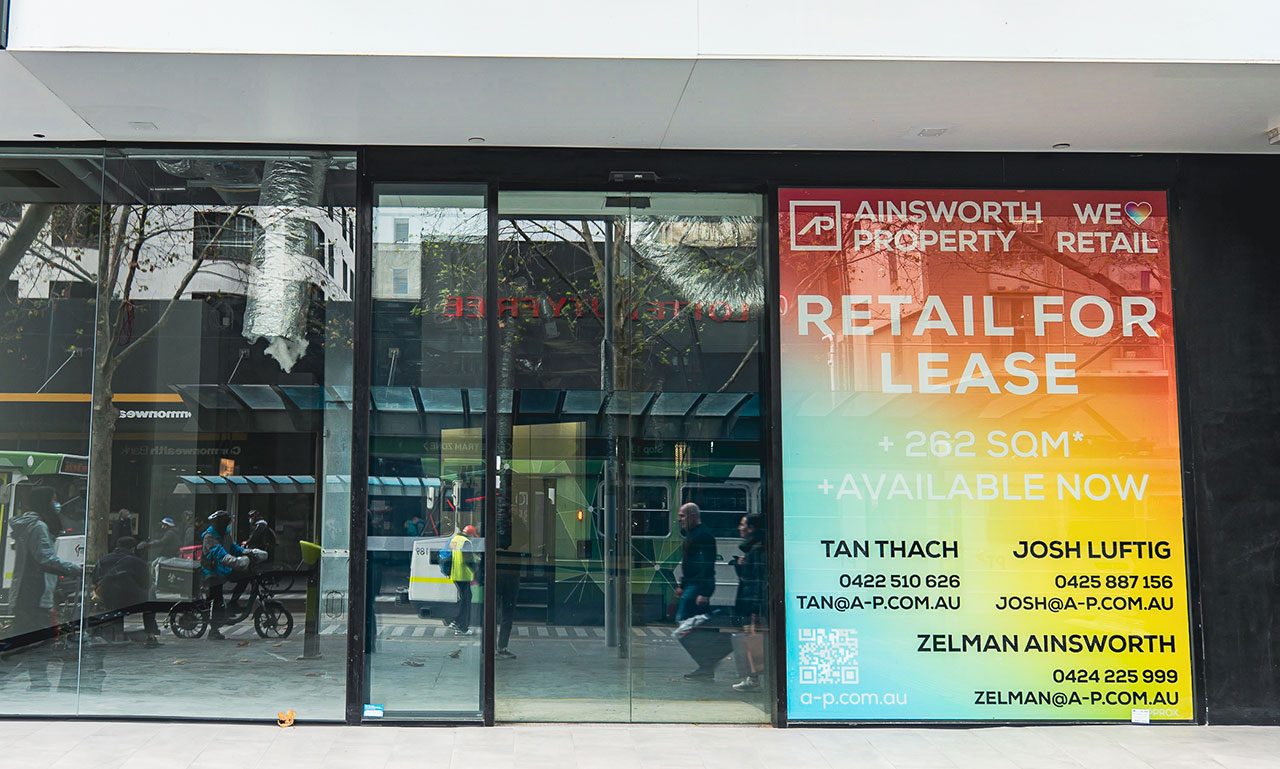This article is from the Australian Property Journal archive
FOR lease’ signs are becoming a more common feature on CBD shop fronts, says the retail industry body, as COVID-19 lockdowns in some parts of the country have directly impacted in-store and online sales in July, according to data from credit card company Mastercard.
According to the Mastercard SpendingPulse™, which measures in-store and online retail sales across all forms of payment, retail sales across the country fell 5.6% in July compared to the previous month (seasonally adjusted) and are down 6.3% compared to the same time last year. However, when compared to July 2019 (the last non-pandemic year) sales are up 6%.
Greater Sydney and surrounding areas were under restrictions in July, with Victoria, South Australia, parts of Western Australia and the Northern Territory also going in and out of lockdown over the course of the month.
The July lockdowns saw payroll jobs decline by 2.4% nationally, according to the Australian Bureau of Statistics latest data. The falls were led by New South Wales (down 4.4%), which usually accounts for around a third (32.0%) of total payroll jobs and Victoria around a quarter (26.2%). Due to lockdowns in these two states, there were a strong fall in payroll jobs nationally.
Australian Retailers Association CEO Paul Zahra said lockdowns have a direct impact on retail sales.
“Delta is continuing to cause damage to businesses and livelihoods, in particular for our economic capital Sydney, where a nine-week lockdown is confirmed with no guarantee that restrictions will ease at the end of the month.
“‘For lease’ signs are becoming a more common feature on CBD shop fronts in Sydney and Melbourne where the Delta devastation has been more severe and state and federal supports haven’t been enough to save businesses from closing their doors permanently,” Zahra said.
The Mastercard data reveals month on month falls in the categories of clothing (down 19.9%), department stores (down 5.4%) and food retailing (down 1.2%). Household goods increased marginally by 0.8%, however there were year on year falls across all categories.
He warns there won’t be an immediate “snap back” with the pandemic pain to be felt over the coming months.
“The insights also show that while consumer confidence has weakened as a result of lockdowns across various states, the 2-year growth mark ticked up. And in States/Territories such as Western Australia and the Northern Territory where lockdowns are less common, 2-year growth is up 16.2% and 8.9% respectively,”
“Lockdowns have a direct impact on retail sales as well as business and consumer confidence, and those impacts can be felt long after restrictions are eased, as it takes time for confidence and foot-traffic to build up again – it’s not an immediate snap back to the way things were.
“Many battle-weary businesses are on the brink of emotional and mental health collapse – not just financial difficulty. We need to be looking at ways we can reopen businesses where case numbers are low and vaccination rates are high as a pathway out of this situation,” Zahra said.
Mastercard SpendingPulse July 2021
| SECTORS (TOTAL SALES) | SEASONALLY ADJUSTED GROWTH | NOMINAL SALES GROWTH | |
| Jul-21 vs Jun-21 | Jul-21 vs. Jul-20 | Jul-21 vs Jul-19 | |
| TOTAL AUSTRALIA RETAIL SALES | -5.6% | -6.3% | +6.0% |
| Clothing | -19.9% | -14.2% | -11.9% |
| Department stores | -5.4% | -14.1% | +1.4% |
| Household goods | +0.8% | -4.6% | +14.9% |
| Food retailing | -1.2% | -2.1% | +13.0% |




